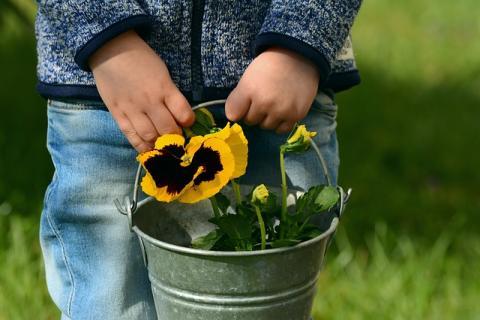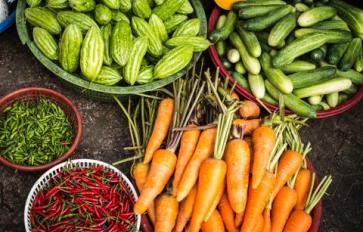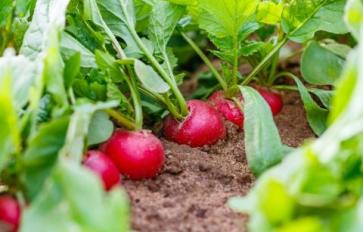
My five-year-old son bounds out of bed before my husband and I have opened our eyes. Messy-haired, barefoot, and still in his pajamas, Asher runs outside to check on the strawberries. The sun hasn’t reached the garden before Asher has spotted the only one red enough to pick and popped it in his mouth. I’ve come out to meet him with a baby on my hip and a watering can in my hand. This garden, like the mop-top kiddo in front of me, is my first. We moved to the country three years ago, and I’ve finally worked up the courage to put some seeds in the ground. Seeds from packets at the supermarket. Seeds of the things we like to eat (like watermelons) and of the things I would like us to like to eat (like carrots). The strawberries were transplanted but don’t yet yield much. One small berry here, another ripe one there. Enough sweetness, though, to satisfy a little boy who hasn’t been awake more than a few minutes.
There is so much I want to learn about the growing of this garden. I want to learn the mysteries of getting food from the earth. I want to learn how to be patient. I want to learn how to be tender and useful to the small beings in my care. In a certain way, I dream that this garden will tend me, help me blossom. Growing up in New York City, I was raised to avoid dirt like the actual plague. When our first seeds in this new garden started sprouting, I was astonished. “Wow! I can’t believe it! We planted the seeds and then they grew!” My husband laughed, “Well, that is the way it works.” But it still felt like a miracle. Now I’m off dreaming of dinners made with fresh tomatoes, canning our own jam, fairy houses in the herb patch, flowers to cut and put in a vase.
My reverie is interrupted by the sound of my five-year-old, tromping through the barely marked beds, noticing the green buds, some with their seed shells still attached. He asks when we can pull the carrots (he wants so badly to pull something out of the ground), when we will see the pumpkins (thinking of jack-o’-lanterns already). The garden works on its own time and in its own way, I tell him. And with that we start our day.
July
At first, the rhythm of the garden moves us seemingly on its own. The water, the earth, the fresh air, the warmth of the sun -- it all feels elemental. Everyday, Asher checks his strawberries, eating the ripe ones immediately. We celebrate every new sprout, every flower. As the summer moves along, though, tending the garden becomes a chore. The weeding gets harder as the baby on my hip becomes a baby crawling in the dirt. How to keep him from pulling out the calendula instead of the invading chicory? How to keep him from gnawing on the rocks he digs up? He’s eating dandelion fluff -- is he going to get sick? Our visits to the garden become shorter and less frequent.
A drought settles in and my tin watering can is no longer sufficient. It is replaced by an extra long hose that we have to hook up to our water heater in the basement because the nozzle on the outside of the house is broken. The hose winds around the backyard, getting underfoot, making mud puddles where it drips. One particularly busy day, I give Asher and his cousin the task of watering the garden with the hose by themselves. “Point it at the bottom of the plants!” I yell out the door. “Make sure to water them really well!” Ten minutes later I look out the window and the two boys are soaked, laughing hysterically, spraying each other in the face. I put laundry and dishes and dinner on hold while I locate a sufficient number of towels and changes of clothes.
Eventually the strawberry plants no longer fruit, but even if they did, any berries would be hard to find. The weeds have made a full invasion, literally blurring the lines between garden and grass. By the end of July, we have still not built any fairy houses. I thought they would be magical, but my rough-and-tumble boy has no interest. Maybe the baby will enjoy them someday. Before he gets too big.
August
Standing in the backyard looking at the garden, my mind has abandoned it and retreated to my dreams of next year’s. This year’s garden is now so dense you’d barely know it was ever a garden at all. But next year’s garden is beautiful. The beds in next year’s garden -- full of robust basil, cucumbers for pickling, cheerful sunflowers -- are all clearly marked. In next year’s garden, the pumpkin flowers turn into pumpkins instead of withering. I see us working happily -- the baby, in next year’s garden a walking toddler, with his own watering can; Asher with a trowel and gloves, digging dandelion and chicory roots. Weeding and wildcrafting at the same time. The hours roll along lazily as we enjoy our day in the sun.
My daydreams are interrupted by our neighbor, a retired flower arranger, stopping by with arms full of corn -- a surplus for her and a boon for us. I find myself apologizing for the state of the garden. “It’s such a mess! This summer was so busy, I just let the weeds take over. Next year I’ll have a better handle on it.”
“Oh, weeds? Are you kidding me?” she says. “I love weeds. I make wreaths out of plain grass. I didn’t think it would work, but it does.”
One late summer evening, Asher goes out in search of tomatoes. By now, the grass is nearly as tall as he is. Like the strawberries in June, our August tomatoes have been few and far between, but tonight I am committed to BLTs for dinner. Asher digs through the ragged tomato patch to find two small Romas, just about the size of cherry tomatoes. He brings them inside and leaves them on the table. I tell him I’ll go out and look around for some big ones. “I found some big ones,” he tells me. I ask him to show me, and he points to the two he just brought in. I can’t help laughing. This garden isn’t about my dreams, but about my children’s real life. Where I see all my designs thwarted, they see a glorious manifestation of the promise of the garden. To them, the garden was always magical. Because seeds and sun and soil and water are magic. Because they could find treasure in the dirt and then eat it. The garden is magical because it is wild and free. Just like these boys in front of me. Growing, boundless, miraculous. We sit down for dinner and eat the tiny Romas. They are delicious.








